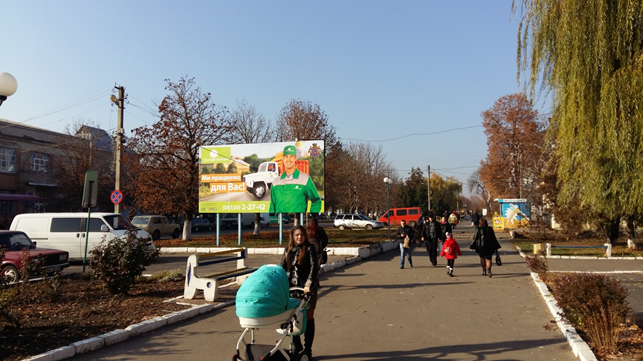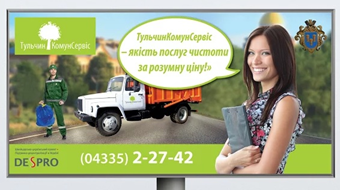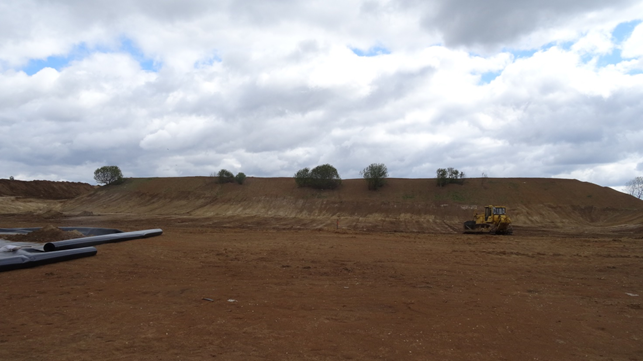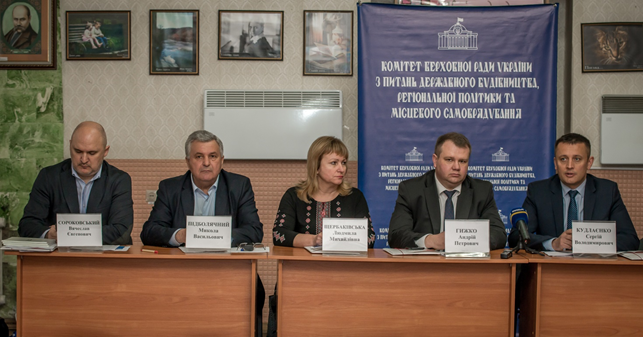There is light at the end of the tunnel – the experience of solving the problem of solid household waste management in Tulchyn community
SOS
Ukrainian cities and villages, forests and fields are critically cluttered up with solid household waste – this is a disturbing and alarming fact of the present. “Lviv debris” has become a meme, but it is a much more scale-effect problem because it is not only about Lviv, but about the majority of the settlements. The situation is already at the SOS stage, because the composition of household waste has changed over the last decade, and there has been a steady increase in its volume, while the practice of waste management has remained “antediluvian”, or has even deteriorated. Not only ecologists, public figures and journalists, but also ordinary inhabitants of settlements pay attention to the “garbage” crisis in the country, because the problem is visible to the naked eye – spontaneous landfills, dirt, bottles and wrappings under the feet, stench from smouldering garbage dumps, etc.
People understand that there are several reasons for this pitiful situation. This is not just a kind of specific mentality of the Ukrainians, which induces them to drop litter straight under their feet and allows to throw garbage into the forest or on a roadside instead of sorting and passing the sorted waste for recycling, or at least just to pay for the waste disposal service. There are also other systemic challenges that deal with the powers and capacity of local self-government bodies, their competence, and readiness to solve the problem in a comprehensive way.
The fact is that the modern system of solid household waste (SHW) management is the whole cycle, the whole technology from collecting, sorting, to dumping or recycling. It should be based on economically reasonable tariffs, including extensive informational and educational outreach activity. All this requires appropriate professional competence, considerable investment, support and trust of the population.
Not always one single community, especially rural one, will be able to provide all these components, because the community's powers are not yet backed up by adequate financial resources, as well as skilled professional staff. Community cooperation might be one of the ways to overcome this problem. It is referred to the Law of Ukraine “On Cooperation of Territorial Communities”, which came into force in June 2014. Although the existing legislative environment at the time of writing this article does not yet give full freedom to communities to cooperate in this complex issue, certain achievements already exist.
The case of Tulchyn Inter-Municipal Project on SHW Management
The heroes of our story are the town of Tulchyn, the rayon centre in Vinnytsia region, and the surrounding communities of Kynashiv and Suvorivske village councils. The total number of inhabitants in these administrative units is 26,000.
Like most small towns, Tulchyn had typical problems related to waste: spontaneous garbage dumps, for the liquidation of which considerable funds were spent annually from the budget, lack a sanitation scheme required by the Law of Ukraine “On Waste”, a loss-making utility company that is forced to borrow fuel and default workers’ wages, adjacent territories are not provided with containers. Garbage collection in Tulchyn and in some of the nearby villages was carried out sporadically, once a week, because of the lack of sufficient equipment. The garbage dump (it is important to emphasize that it was a garbage dump, not a landfill or disposal site), built in 1990, with a service life of 20 years, was completely overloaded, with neither monitoring equipment, nor engineering facilities. Harmful substances seeped through the soil down to the aquifers.
The local authorities – local councils of Tulchyn town, villages of Kynashiv and Suvorovske, Tulchyn Rayon Council and Rayon Administration – came to a conclusion that water never flows under settled stone, and began to act simultaneously in two directions: they tried to solve the problems that could be overcome independently, but in addition, they looked for investors, donors, partners, experts in order to solve the problem competently and comprehensively. They also applied to the then existing State Fund for Local Self-Government Support and international donor organizations.
It should be noted that it was the active stance, political will and concrete steps to solve the problems on their own by local authorities that played a major role in the fact that external assistance was finally provided. For example, the executive committee of the Tulchyn City Council made a difficult decision to conduct a management and financial audit of the local public utility company “Tulchynkomunservice” - an unusual step in our country, which showed specific gaps in management. Based on the results of the audit, the plan for further operation of the utility company was officially approved, which enabled it to effectively reform its activities.
As a result, donors and specialists were found. At the expense of the Fund for Local Self-Government Support, refuse collection equipment was purchased. And in 2010, the rayon authorities and the Tulchyn City Council turned to the Swiss-Ukrainian Decentralization Support Project in Ukraine - DESPRO with the request to support technical solutions in the field of solid waste management. Together with the experts of the international project, the Integrated Solid Waste Management Strategy was developed – a document that has become the technical basis for the modernization of the waste management system in Tulchyn and the surrounding rural and settlement communities. Besides, the initiative was supported by the UNDP Municipal Governance and Sustainable Development Program, which provided information and communication support to the initiatives of the local authorities till 2012.
In the spring of 2011, the Local Working Group and Project Steering Committee were established, and a Memorandum of Understanding between participating communities was signed. Representatives of the Head Department of Housing and Communal Services of the Vinnytsia Oblast State Administration and the Ministry of Regional Development were included in the Steering Committee of the Inter-Municipal Project on solid waste management. The first thing that was accomplished by the Committee was the assessment of the current situation. It was found out that the Utility Company “Tulchynkomunservice” collected and disposed about 80% of all household waste accumulated in Tulchyn, but only a third of the population paid for that service. As far as Suvorove and Kynashiv communities are concerned, the majority of the local population followed mainly dangerous and ‘unenlightened’ practices of solid waste treatment – they burned, dumped on the roadside or buried it. Only 3-10% of the waste was removed from these settlements in an organized way. Separate collection of electronic and hazardous waste was absolutely out of the question. When the composition of waste was investigated, it turned out that half of it was organic – food waste that can be composted, 25% included recyclables: glass, paper, metal, plastic. That is, 75% of the waste can be recycled!
The Steering Committee has formed the vision of the project goals:
-
coverage of 100% of the population with high-quality services of solid waste collection and removal;
-
coverage of 90% of the population and 100% of organizations with services of solid waste collection and removal;
-
economically feasible but affordable tariff; • separation of waste in households, separate collection of hazardous waste;
-
reclamation of the existing landfill;
-
creation of a new technological test site with a composting field;
-
promotion of public awareness, changing people's behaviour, which reduces the amount of waste generated, improves the separate collection, civilized and rational treatment of solid waste.
Achievements
Since “Tulchynkomunservice” Utility Company was defined as the main provider of the solid waste management project, the company has undergone radical reforms: the premises have been repaired and have become much more convenient and friendly to customers, the range of services has significantly expanded. The number of subscribers (consumers) has increased, because the company started working with them, encouraging the conclusion of contracts in different ways, subscriber accounting became electronic – all data is stored in digital format. Cash register in the office of the UC makes it possible to pay for services directly on the spot without any commission or a queue. With the help of the information campaign, people were told that the utility was created and works for their benefit by providing services that are worth the payment. The Utility Company “Tulchyncomunservice” has got a logo and own brand. As it turned out, it is also important for people to understand that garbage does not disappear from the city by itself, that people from this particular enterprise work for this. In parallel with the advertisement of the UC “Tulchynkomunservice”, people were explained the principles of separate collection of waste and utilization within the framework of the information campaign “Less garbage – a better life”.

An important step towards the implementation of the plan was the purchase of the necessary machinery and equipment – two vehicles and a press for recyclables, arrangement of 47 waste container sites with containers for different kinds of waste - not only in residential areas, but also in public places, from which the machinery began to remove waste regularly. But in order for the system to be sustainable and economically feasible, the Strategy provided for a gradual increase in tariffs. While in 2012 the tariff for the population was 4.44 UAH per person per month, then in 2013 it was necessary to raise the tariff by 10%, and in 2014 – by 17% more.
Without adopting this policy decision to increase the tariff, as well as without ensuring the maximum coverage of consumer with the paid services, it would be impossible to cover the costs of introducing a new scheme of integrated solid waste management. Moreover, the proposed tariff was only 0.31-0.37% of the average income per person in the Vinnytsia oblast. This is also one of the decisions that show the political will of the local authorities to change, which, in turn, gives a signal to donors and investors about the readiness of the community to take concrete steps in implementing the project.
Changes for the better are self-evident. Slowly but steadily though, within 5 years (from 2013 to 2017) the UC “Tulchynkomunservice” has evolved from a loss-making into a profitable enterprise. The earned revenue is directed to the closure of the existing garbage dump and the acquisition of equipment for a new landfill that was built to replace the old dump. In addition, the utility company has sold the first batches of sorted plastic and paper to the recycling companies.

In 2011 the level of coverage of the population across the whole Tulchyn target region reached only 22%, but in 2015 this figure increased to 49%. It is still far from 90% of the target values, but it should be taken into account that changing the psychological attitudes and mentality of the population is a time consuming process. The level of satisfaction with the quality of service in 2011 was 36.6%, while in 2015 it was already 73.1%, which is twice as good.

These achievements have not remained unnoticed by the central authorities. On April 30, 2017, a round table was held in the small rayon centre Tulchyn under the auspices of the Verkhovna Rada Committee on State Building, Regional Policy and Local Self-Government. The topic of the discussion was Tulchyn practice of inter-municipal cooperation, that is, the actual implementation of the Law of Ukraine “On Cooperation of Territorial Communities”. Tulchyn residents have shown how fruitful this cooperation can be in matters that the community cannot manage on its own; and parliamentarians expressed their readiness to improve the legislation so that other communities could eventually join successful communities. It is expected that the Parliament will also adopt as a basis the draft law on amending the Law of Ukraine “On Cooperation of Territorial Communities” in terms of introducing the procedure for joining the organized (existing) cooperation of territorial communities (Reg. No. 5341).
That is, in lay terms this means that if communities agree on cooperation in dealing with waste issues and they are doing a good job, then the surrounding communities can also join such cooperation.

Valerii Vesnianyi, Mayor of Tulchyn, recalls the whole difficult way of implementing the project, beginning with 2010, with the following words: “We wanted to do everything right, we hoped for success so strongly that we did not miss a chance to meet with those who, in our opinion, could help us. We knocked on all doors with a frenzied perseverance. They would get into a car and travel hundreds of miles to get to the relevant events, to tell about our problem, to talk to the experts... We then somehow did not think how complicated and long the process was, but now, looking back, we understand how important it is to accompany each our step with information support, to explain to people every decision. We paid attention to this, but, as I can see now, this is one of the fundamental things in the solid waste management projects. Support of the population, understanding from the people – this is the main thing... My grandson is now 13 years old. When our project began, he was only six years old, he went to a kindergarten. Now he is a teenager and he teaches his parents how to handle waste, how to twist a plastic bottle, because it sank in from the kindergarten, when we started working with children and invited specialists who explained those simple rules to them. He will never treat waste in an uncivilized and barbarian way, because he is different, you see? These rules sink in from childhood and forever. I dream that all the central channels, at least a couple of times a day for a few seconds, demonstrated and told people why and how to treat waste, then it would make sense... Was it difficult? You know, sometimes I felt utterly discouraged and became the biggest pessimist in the world. But now I know that you should not take into account the time when you implement such a system project. Step by step, but you go towards the goal and implement what was conceived, to make the dream come true. No one - neither the president nor the government - will come and do it for us. There are still a lot of problems in the town. I am reproached for the lack of a beautiful paving slab in the centre of the town, which is clearly visible, which catches your eye. But this very expensive technological landfill, which we have spent funds on, is not in the centre of the town, it does not catch the eye. It's like health, which you remember when you lose it. That's what we have. This project is not visible at once, but we know that it has the impact with a vengeance! First, we have much fewer spontaneous dumps. They are almost overcome, and garbage is being removed. People have changed, they separate waste. Our container for glass is filled in only 10 days on the average. So people have appreciated all this. And paving slab will be laid in a while”.
P.S. On December 18, 2016, the Tulchyn Amalgamated Territorial Community was formed, which included several other settlements that had not previously been covered by the waste collection and removal service. Therefore, the community leadership faces new challenges and tasks: to attract new residents to involve waste collection, to attract new customers of the utility company services. But there is no doubt that Tulchyn community is doomed to success. And there is no doubt that other communities should carefully look into their experience and adopt it, so as not to drown in the garbage.


